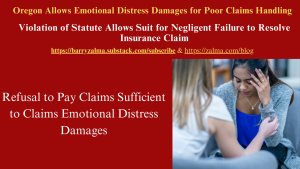Oregon Allows Emotional Distress Damages for Poor Claims Handling

Post 4706
See the full video at https://rumble.com/v45wcqx-oregon-allows-emotional-distress-damages-for-poor-claims-handling.html and at https://youtu.be/WW9Ij4oK0rQ
Christine Moody, individually, and in her capacity as the Personal Representative of the Estate of Steven “Troy” Moody, Deceased v. Oregon Community Credit Union, aka OCCU, an Oregon entity, association, union, or corporation et al., Defendants, and Federal Insurance Company, an Indiana corporation, 371 Or. 772, SC S069409, Supreme Court of Oregon (December 29, 2023)
Plaintiff, whose husband was accidentally shot and killed during a camping trip, brought this action against defendant, a first-party life insurer, claiming, among other things, that defendant had negligently failed to investigate and pay her claim for policy benefits, causing her to have fewer financial resources to navigate the loss of a bread-winning spouse and, consequently, to suffer economic harm and emotional distress.
FACTS
Plaintiffs husband, decedent, was accidentally shot and killed by a friend during a camping trip. Plaintiff filed a claim for life insurance policy benefits, and defendant initially denied plaintiffs claim on the ground that decedent’s death fell within a policy exclusion for deaths “caused by or resulting from [decedent] being under the influence of any narcotic or other controlled substance”-apparently based on the fact that decedent had had marijuana in his system at the time of his death.
Plaintiff sued alleging claims for breach of contract, breach of an implied contractual covenant of good faith and fair dealing, and negligence. Plaintiff sought both economic damages-the benefits payable under the policy-and emotional distress damages.
Defendant filed motions to dismiss plaintiffs’ claims for negligence and breach of the implied covenant of good faith and fair dealing and to strike the allegations seeking damages for emotional distress, arguing that plaintiffs only remedy under Oregon law was contractual. Plaintiff appealed the limited judgment but, while the appeal was pending, she filed an amended complaint that alleged only breach of contract and sought only the amount of benefits payable under the insurance policy-$3,000. Thereafter, defendant paid the $3,000 to plaintiff, the parties stipulated to the entry of a judgment in favor of plaintiff and against defendant, and the trial court entered a conforming general judgment.
ANALYSIS
Plaintiff takes the position that her claim for common-law negligence against defendant for its failure to act reasonably in performing the obligations of a life insurer and that she is entitled to recover the emotional distress damages that she alleges.
Plaintiffs’ Negligence per se claim is a shorthand for a negligence claim in which the standard of care is expressed by a statute or rule. When a negligence claim exists, and a statute or rule defines the standard of care expected of a reasonably prudent person under the circumstances, a violation of that statute or rule establishes a presumption of negligence.
The Supreme Court Concluded that it is settled that a negligence complaint, to survive a motion to dismiss, must allege facts from which a factfinder could determine (1) that defendant’s conduct caused a foreseeable risk of harm, (2) that the risk is to an interest of a kind that the law protects against negligent invasion, (3) that defendant’s conduct was unreasonable in light of the risk, (4) that the conduct was a cause of plaintiffs harm, and (5) that plaintiff was within the class of persons and plaintiffs injury was within the general type of potential incidents and injuries that made defendant’s conduct negligent.
Perhaps the simplest legally protected interest is in being free from physical harm at the hands of another. Physical harm includes both bodily injury and property damage. Generally, however, people do not have a legally protected interest in being free from emotional distress, and, to date, the Supreme Court has permitted common-law tort claims for emotional distress damages only in the following three circumstances: (1) when the defendant also physically injures the plaintiff; (2) when the defendant intentionally causes the emotional distress; or (3) when the defendant negligently causes foreseeable, serious emotional distress and also infringes some other legally protected interest.
In contrast to physical harm, emotional harm occurs frequently. Any number of people may suffer emotional distress as the foreseeable result of a single negligent act.
Whether Plaintiff Here Has Alleged A Legally Protected Interest Sufficient To Subject Defendant To Liability For Purely Emotional Damages
In the case now before us, we must consider whether plaintiff has alleged a legally protected interest sufficient to subject defendant to liability for emotional distress damages. To decide whether that alleged interest is a legally protected interest sufficient to subject defendant to liability for emotional distress damages.
The statute, ORS 746.230, prohibits (1) “[refusing to pay claims without conducting a reasonable investigation based on all available information,” ORS 746.230(1) (d); and (2) “[n]ot attempting, in good faith, to promptly and equitably settle claims in which liability has become reasonably clear,” ORS 746.230(1)(f).
ORS 746.230 includes conduct that is independent of the obligation to pay benefits due under the insurance policy. For example, ORS 746.230 prohibits insurers from, “[flailing to acknowledge and act promptly upon communications relating to claims,” ORS 746.230.230(1)(b); “[f]ailing to affirm *** coverage of claims within a reasonable time,” ORS 746.230.230(1)(e); and “Compelling claimants to initiate litigation to recover amounts due,” ORS 746.230(1)(g). Those prohibitions suggest that the harm that the legislature sought to prevent was not limited to the financial harm that occurs when insurance benefits are not paid.
The Supreme Court will not permit recovery of purely emotional injury unless it determines that the claimed harm is “of sufficient importance as a matter of public policy.” The Supreme Court concluded that the question whether plaintiff has alleged a viable common-law negligence claim against defendant for emotional distress damages in the affirmative. It then cautioned that the conclusion does not make every contracting party liable for negligent conduct that causes purely psychological damage, nor does it make every statutory violation the basis for a common-law negligence claim for emotional distress damages. Far from it. Few contracting parties promise to provide necessary financial resources on the death of a spouse knowing that their obligation to act reasonably in doing so is required by statute. And few statutes impose obligations on contracting parties designed to protect the parties from the type of emotional harm that plaintiff in this case allegedly suffered. The decision in this case is a narrow one that applies and accords with the limiting principles that have been guided by past decisions and does not unfairly expose defendant to liabilities that it could not have expected and guarded against.
Plaintiff has alleged a viable common-law negligence claim against defendant for emotional distress damages. Therefore, the trial court erred in granting defendant’s motions to dismiss plaintiffs negligence claim and in striking her claim for emotional distress damages.
The state of Oregon, like many states, has enacted statutes punishing insurers for bad faith claims handling. The insurer, after a change in allegations, paid the plaintiff the $3,000 life insurance limit, only to find itself sued for negligent claims handling. The suit was dismissed by the trial court and reversed by the Court of Appeals and the Oregon Supreme Court. Since the statute requires fair claims handling the plaintiffs allegations allowed it to sue the insurer for emotional distress damages when it initially refused to pay because of an exclusion. This is a limited decision and stretches the obligations of an insurer beyond fairness and even with a clear and unambiguous exclusion it can be sued for emotional distress.
 (c) 2024 Barry Zalma & ClaimSchool, Inc.
(c) 2024 Barry Zalma & ClaimSchool, Inc.
Please tell your friends and colleagues about this blog and the videos and let them subscribe to the blog and the videos.
Subscribe to my substack at https://barryzalma.substack.com/publish/post/107007808
Go to Newsbreak.com https://www.newsbreak.com/@c/1653419?s=01
Go to the podcast Zalma On Insurance at https://podcasters.spotify.com/pod/show/barry-zalma/support; Go to Barry Zalma videos at Rumble.com at https://rumble.com/c/c-262921; Go to Barry Zalma on YouTube- https://www.youtube.com/channel/UCysiZklEtxZsSF9DfC0Expg; Go to the Insurance Claims Library – http://zalma.com/blog/insurance-claims-library.
Like this:
Loading…







